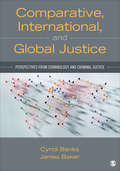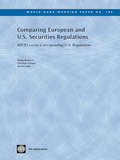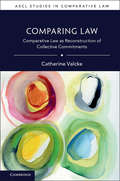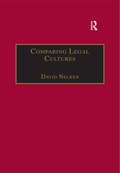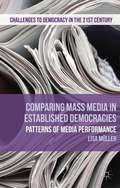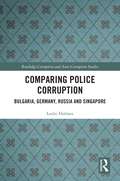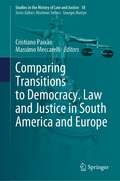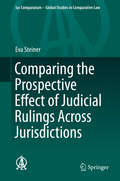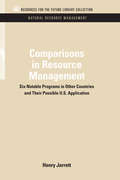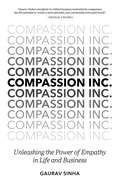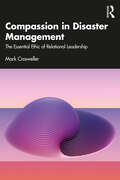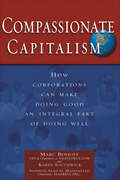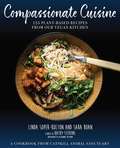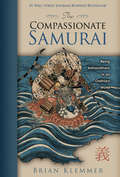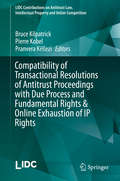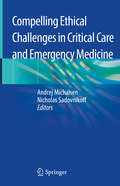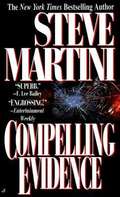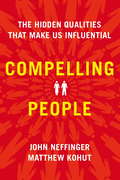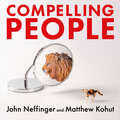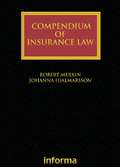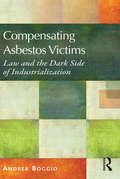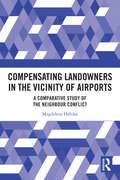- Table View
- List View
Comparative, International, and Global Justice: Perspectives from Criminology and Criminal Justice
by Denis William Baker Cyndi L. BanksComparative, International and Global Justice: Perspectives from Criminology and Criminal Justice presents and critically assesses a wide range of topics relevant to criminology, criminal justice and global justice. The text is divided into three parts: comparative criminal justice, international criminology, and transnational and global criminology. Within each field are located specific topics which the authors regard as contemporary and highly relevant and that will assist students in gaining a fuller appreciation of global justice issues. Authors Cyndi Banks and James Baker address these complex global issues using a scholarly but accessible approach, often using detailed case studies. The discussion of each topic is a comprehensive contextualized account that explains the social context in which law and crime exist and engages with questions of explanation or interpretation. The authors challenge students to gain knowledge of international and comparative criminal justice issues and think about them in a critical manner. It has become difficult to ignore the global and international dimensions of criminal justice and criminology and this text aims to enhance criminal justice education by focusing on some of the issues engaging criminology worldwide, and to prepare students for a future where fields of study like transnational crime are unexceptional.
Comparative, International, and Global Justice: Perspectives from Criminology and Criminal Justice
by Denis William Baker Cyndi L. BanksComparative, International and Global Justice: Perspectives from Criminology and Criminal Justice presents and critically assesses a wide range of topics relevant to criminology, criminal justice and global justice. The text is divided into three parts: comparative criminal justice, international criminology, and transnational and global criminology. Within each field are located specific topics which the authors regard as contemporary and highly relevant and that will assist students in gaining a fuller appreciation of global justice issues. Authors Cyndi Banks and James Baker address these complex global issues using a scholarly but accessible approach, often using detailed case studies. The discussion of each topic is a comprehensive contextualized account that explains the social context in which law and crime exist and engages with questions of explanation or interpretation. The authors challenge students to gain knowledge of international and comparative criminal justice issues and think about them in a critical manner. It has become difficult to ignore the global and international dimensions of criminal justice and criminology and this text aims to enhance criminal justice education by focusing on some of the issues engaging criminology worldwide, and to prepare students for a future where fields of study like transnational crime are unexceptional.
Comparing European and U.S. Securities Regulations
by Caroline Cerruti Michel Noel Tanja BoskovicThis paper, aimed at professionals, scholars, and government officials in the field of securities regulations, compares the European (specifically the Market in Financial Instruments Directive-MiFID) and U.S. securities regulations. The analysis focuses on the regulatory and supervisory framework, trading venues, and the provision of investment services. We show that although there may be regional differences in the structure and rules of current securities regulation, the objectives and some outcomes of regulation are comparable. Similarly, as the current global financial and economic crisis exposed gaps in securities regulations worldwide, regulators in both regions face similar challenges. This study will be particularly useful for World Bank member countries that are looking at either the European or U.S. regulations when conducting market reforms.
Comparing Law: Comparative Law as Reconstruction of Collective Commitments (ASCL Studies in Comparative Law)
by Catherine ValckeThe enterprise of comparative law is familiar, yet its conceptual whereabouts remain somewhat obscure. Comparing Law: Comparative Law as Reconstruction of Collective Commitments reconstructs comparative law scholarship into a systematic account of comparative law as an autonomous academic discipline. The point of that discipline is neither to harmonize world law, nor to emphasize its cultural diversity, but rather to understand each legal system on its own terms. As the proposed reconstruction exercise involves bridging comparative law and contemporary legal theory, it shows how comparative law and legal theory both stand to benefit from being exposed to each other. At a time when many courses are adding a transnational perspective, Valcke offers a more theoretical, broadened, and refreshed view of comparative law.
Comparing Legal Cultures (Socio-Legal Studies)
by David NelkenThis volume cross-examines mainstream approaches to studying legal culture (e.g. those of Friedman and Blankenburg). It includes debates over the concept of legal culture and a variety of case studies of different legal cultures.
Comparing Mass Media in Established Democracies: Patterns of Media Performance (Challenges to Democracy in the 21st Century)
by Lisa MüllerThis book examines the contribution of mass media to modern democracies, in comparative perspective. Part I deals with the conceptualization and implementation of a systematic framework to assess democratic media performance, both in terms of media systems and content. Part II studies media effects on the quality of democracy.
Comparing Police Corruption: Bulgaria, Germany, Russia and Singapore (Routledge Corruption and Anti-Corruption Studies)
by Leslie HolmesThis book analyses police corruption across four country case studies, exploring how the problem manifests in each country and how it can be reduced. The problem of police corruption ranges from having to pay a bribe to a traffic cop to avoid a speeding fine, right up to more serious forms, such as collusion with organised crime groups and terrorists. The issue therefore constitutes a significant security threat and a human rights issue, but it is often difficult to understand the extent of the problem, and how it varies across contexts. This book analyses the corruption situation in Bulgaria, Germany, Russia and Singapore, identifies similarities and differences across them, and analyses the various means of addressing the problem: punitive, incentivising, technological, administrative and imaging, and the role of civil society. Drawing on existing literature and research, the book also makes extensive use of local sources and original survey data across the four countries. As comparative literature on police corruption remains rare, this book’s survey of the situation in two developed states and two post-communist transition states will be of considerable interest to students and researchers across corruption studies, criminology, police studies and security studies, as well as practitioners working in anti-corruption and law enforcement agencies.
Comparing Tort and Crime
by Matthew DysonThe fields of tort and crime have much in common in practice, particularly in how they both try to respond to wrongs and regulate future behaviour. Despite this commonality in fact, fascinating difficulties have hitherto not been resolved about how legal systems co-ordinate (or leave wild) the border between tort and crime. What is the purpose of tort law and criminal law, and how do you tell the difference between them? Do criminal lawyers and civil lawyers reason and argue in the same way? Are the rules on capacity, consent, fault, causation, secondary liability or defences the same in tort as in crime? How do the rules of procedure operate for each area? Are there points of overlap? When, how and why do tort and crime interact? This volume systematically answers these and other questions for eight legal systems: England, France, Germany, Sweden, Spain, Scotland, the Netherlands and Australia.
Comparing Transitions to Democracy. Law and Justice in South America and Europe (Studies in the History of Law and Justice #18)
by Cristiano Paixão Massimo MeccarelliThis present book examines some of the key features of the interplay between legal history, authoritarian rule and political transitions in Brazil and other countries from the end of 20th Century until today. This book casts light on these aspects of the role of law and legal actors/institutions. In the context of transition from authoritarian rule to democratic state, Brazil has produced a significant literature on the challenges and shortcomings of the transition, but little attention has been given to the role of law and legal actors/institutions. Different approaches focus on the legal mechanisms, discourses and practices used by the military regime and by the players involved in the political transition process in Brazil. A comparative perspective that takes into account different political transitions – and their legal consequences – in Europe and Latin America complements the analysis. Part 1 (4 essays) discusses some of the central issues of political transition and legal history in contemporary Brazil, focusing on the time of the transition (and its effects on transitional justice) with different perspectives, from racial and gender issues to constitutional reform and police repression. Part 2 (3 essays) brings the comparative studies on South American experiences. Part 3 (4 essays) analyses different cases of transition to democracy in Chile, Portugal, Spain and Italy. Part 4 (3 essays) proposes a historiographical and methodological approach, considering the politics of time involved in the interplay between political transitions and legal history.
Comparing the Prospective Effect of Judicial Rulings Across Jurisdictions (Ius Comparatum - Global Studies in Comparative Law #3)
by Eva SteinerThis work deals with the temporal effect of judicial decisions and more specifically, with the hardship caused by the retroactive operation of overruling decisions. By means of a jurisprudential and comparative analysis, the book explores several issues created by the overruling of earlier decisions. Overruling of earlier decisions, when it occurs, operates retrospectively with the effect that it infringes the principle of legal certainty through upsetting any previous arrangements made by a party to a case under long standing precedents established previously by the courts. On this account, in the recent past, a number of jurisdictions have had to deal with the prospect of introducing in their own systems the well-established US practice of prospective overruling whereby the court may announce in advance that it will change the relevant rule or interpretation of the rule but only for future cases. However, adopting prospective overruling raises a series of issues mainly related to the constitutional limits of the judicial function coupled by the practical difficulties attendant upon such a practice. This book answers a number of the questions raised by this practice. It makes use of the great reservoir of foreign legal experience that furnishes theoretical and practical ideas from which national judges may draw their knowledge and inspiration in order to be able to advise a rational method of dealing with time when they give their decisions.
Comparisons in Resource Management: Six Notable Programs in Other Countries and Their Possible U.S. Application (RFF Natural Resource Management Set)
by Henry JarrettOriginally presented as public lectures in the 1961 Resources for the Future Forum on Comparative Resources Policy and Administration. Originally published in 1961
Compassion Inc.: Unleashing the Power of Empathy in Life and Business
by Gaurav SinhaBe inspired to transform your business to change the world.Do you ever wonder how successful businesses can be used as a force for good? Do you sometimes feel conflicted by the principles of capitalism? Do you wish to change the world around you whilst doing what you love?In this book, Gaurav Sinha, world-class businessman and entrepreneur, founder of Insignia in 2003, outlines the economics of empathy for life and for business. He offers actionable solutions to maintaining a successful trade in a changing global landscape where conscience, ethics, and authenticity are high on the agenda.The world is changing, perceptions are shifting, consumers are evolving, and this book will ensure your business keeps up.
Compassion in Disaster Management: The Essential Ethic of Relational Leadership
by Mark CroswellerShould leadership minimise suffering? This book argues yes: offering leaders, especially those in disaster management, a way to improve their ability to lead, serve, and protect others during disasters and crises.Drawing upon his own experiences as a disaster management specialist as well as high-level interviews with disaster management leaders from the USA, Australia and New Zealand, Crosweller bridges theory and practice to achieve three objectives. Firstly, to establish the political and socio-cultural context in which disaster management leaders find themselves when seeking to protect citizens and minimise their suffering and vulnerability. Secondly, to provide an empirical account of how certain sociocultural influences affect their efficacy as leaders and that of their organisations, when seeking to improve well-being, provide protection, and reduce suffering and vulnerability. Third, to propose a relational leadership framework centred upon an ethic of compassion, and supported by behaviours, characteristics, and practices that can guide leaders when addressing the causes of suffering and vulnerability across the entire disaster management cycle. This framework progressively emerges as the reader navigates their way through each chapter.An essential text for aspiring and experienced leaders, especially those in the fields of Emergency Medical Services, fire services, law enforcement, and emergency management. It will also appeal to students and researchers in related disciplines.
Compassion in the Court: Life-Changing Stories from America's Nicest Judge
by Judge Frank CaprioIn his four-time Emmy-nominated show Caught in Providence, Judge Frank Caprio&’s courtroom became a worldwide beacon of compassionate justice—and an unforgettable watch for millions of fans.Now, Judge Caprio, known as &“the Nicest Judge in the World,&” brings to the page the same wisdom and spirit of decency that viewers around the world have come to treasure. From 1985, when he first took the bench, to when he stepped down in 2023, Judge Caprio dispensed true compassion to a continuous flow of regular people in his municipal traffic court in Providence, Rhode Island. His courtroom was a place where defendants were treated with dignity, and where the deserving were given a break—not a pass or get-out-of-jail-free card, but the chance to right their lives and care for their families. In Compassion in the Court, Judge Caprio shares transformative stories and lessons from his life and courtroom, including: Wisdom he gained from his immigrant parents Stories shared by individuals of all ages who appeared in court How he developed the ability to tell when someone is not telling the truth The power of growing up with someone who believed in him—and how he&’s tried to provide the same for everyone who appeared before him How a person&’s worth isn&’t measured by the mistakes they make, but by their ability to learn from those mistakes Judge Caprio&’s memories will challenge readers to become somebody—to value their past and their family, to confront their realities, and to believe that, through respect, compassion, and understanding, they can succeed. This book will touch your heart, uplift your spirit, and renew your faith in others and in yourself.
Compassionate Capitalism: How Corporations Can Make Doing Good an Integral Part of Doing Well
by Marc Benioff Karen SouthwickThe coauthors are uniquely suited to bring this important issue to light. Marc Benioff is CEO and chairman of Salesforce.com foundation. Salesforce.com has received the Award for Excellence in Corporate Community Service by the Points of Light Foundation and Volunteer Center National Network and the first ever U.S. Chamber of Commerce Corporate Stewardship Award. A former sales and marketing executive at Oracle Corporation, Benioff is now devoting his considerable talent and energy to building an integrated technological business and philanthropic models.
Compassionate Cuisine: 125 Plant-Based Recipes from Our Vegan Kitchen
by Kathy Stevens Linda Soper-Kolton Sara Boan Catskill Animal SanctuarySelected as one of PETA's must-have vegan cookbooks of 2019! Vegan recipes and heartwarming stories for animal lovers, from the Catskill Animal Sanctuary. Add love and stir! Written with love and authenticity, Compassionate Cuisine tells the story of one of the country’s oldest and most respected animal sanctuaries through its food. With humor and heart, Chef Linda Soper-Kolton and Chef Sara Boan, Catskill Animal Sanctuary’s vegan chefs, bring the Sanctuary’s culinary program, Compassionate Cuisine, to life through an array of recipes intended to inspire and delight. Their recipes have been savored and devoured by thousands of visitors to the Sanctuary, and they want to share them with the world. Interwoven with the recipes are the animals. Sanctuary founder and director Kathy Stevens writes for the voiceless many for whom the Sanctuary works so fervently to share the good news about how wonderful–and important–it is to consider compassion first when we eat. Find diverse recipes such as: Blueberry Praline French Toast CasseroleHomestead Granola and Vanilla Nut MilkAvocado Tartines with Peach SalsaBuffalo Cauliflower with Blue Cheese DressingChipotle Sweet Potato Stew with Lime Cashew CremaThai Burgers with Spicy Peanut SauceMoroccan Vegetable and Chickpea TagineChocolate Chip Cookie Dough TrufflesAnd many more! Catskill Animal Sanctuary wants the world to go vegan. It’s who they are. It’s what they do. It’s why hundreds of rescued farm animals call their place home. And it’s why they open their gates to thousands of visitors each year. Now, home cooks everywhere can enjoy the same delicious and compassionate cuisine served at the Sanctuary, and read about the people and animals that make the Catskill Animal Sanctuary such a special place.
Compassionate Samurai: Being Extraordinary In An Ordinary World
by Brian KlemmerIn life there are two types of people. The first are those who are nice, good-hearted, and compassionate but can't make much happen. The other kind can make everything happen-they're the creators, the go-getters, and the aggressive producers in society-however, they're often self-centered, greedy, and unethical. Wouldn't it be great if you could make things happen in a really big way but not lose your integrity? The Compassionate Samurai will show you the way to produce extraordinary results in a dog-eat-dog world and still maintain the highest levels of ethics. You'll learn: How to always be satisfied and motivated regardless of your circumstances Why all people have freedom but very few have liberty What competing commitments are and how they prevent you from having what you want in life The secret to operating optimally in an untrustworthy environment • How to make the shift from scarcity to abundance even if you're knee deep in debt . . . and much, much more!
Compatibility of Transactional Resolutions of Antitrust Proceedings with Due Process and Fundamental Rights & Online Exhaustion of IP Rights (LIDC Contributions on Antitrust Law, Intellectual Property and Unfair Competition)
by Bruce Kilpatrick Pierre Kobel Pranvera KëlleziThis bookprovides an unparalleled comparative analysis of two "hot topics" inthe field of antitrust and unfair competition laws with regard to a number ofkey countries. The first partof the book examines the consistency and compatibility of transactionalresolutions of antitrust proceedings (such as settlement procedures, leniencyprogrammes and commitments) with due process and the fundamental rights of theparties. This is a particularly important topic, given the widespread adoptionof these procedures by anti-trust authorities worldwide. The individual chaptersconsider how the leniency, settlement and commitments procedures have developedacross a range of jurisdictions, and discuss the extent to which checks andbalances have been applied in those national procedures in order to safeguardthe fundamental rights of the parties involved. A detailed international reportidentifies general trends and highlights the differences between and most interestingfeatures of national regulations. The second partof the book gathers contributions from various jurisdictions on the unfaircompetition-related question of the online exhaustion of IP rights. As commerceis increasingly moving online, the respective chapters consider the extent towhich exhaustion and similar concepts have adapted to these rapid changes. Thecomprehensive and insightful international report brings together thesereflections by comparing various national positions. The book alsoincludes the resolutions passed by the General Assembly of the LIDC following adebate on each of these topics, which include proposed solutions andrecommendations. The internationalLeague of Competition Law (LIDC) is a long-standing international associationthat focuses on the interface between competition law and intellectual propertylaw, including unfair competition issues.
Compelling Ethical Challenges in Critical Care and Emergency Medicine
by Andrej Michalsen Nicholas SadovnikoffThis book addresses the ethical problems that physicians have to face every day while caring for critically ill patients. Advances in medical technology, ageing societies worldwide, and their increased demands on health care systems have, on the one hand, led to better care and remarkable longevity in many parts of the world. On the other hand, however, improved treatments in many medical fields, amongst others in emergency and critical care, have resulted in more patients surviving with reduced quality of life. This entails tradeoffs for many patients, their families, and the teams caring for them. At the same time, health care expenditures have risen dramatically and have to be balanced against costs for other public goods. Finally, the humane aspects of care have often failed to keep pace with the remarkable technological strides made in recent years.In this book, experts in their respective fields describe compelling ethical challenges resulting from these discrepancies and discuss potential solutions. The book is primarily intended for clinicians who care for two of the most vulnerable patient subpopulations – those being treated in ambulances or emergency rooms, and those being treated at intensive care units – due in part to the fact that they may be temporarily or permanently incapacitated. Core medical skills, such as diagnosis and predicting outcomes, as well as implementing treatment, remain challenging. However, without adequate communication and collaboration both within the inter-professional treatment teams and between the teams and the patients/their families, delivering excellent care is difficult at best. Therefore, the so-called “soft skills” are given the attention they deserve in order to overcome the gap between technological progress and interpersonal standstill.
Compelling Evidence
by Steve MartiniThe defense lawyer is Paul Madriani. The accused is his ex-lover, Talia Potter. The victim died of a gunshot wound to the head. He was Paul Madriani's boss, his mentor, his friend. And he was Talia Potter's husband...
Compelling People: The Hidden Qualities That Make Us Influential
by John Neffinger Matthew Kohut'This is not just another pop-psych book: it's the first book to capture and share the insights from all the recent groundbreaking research on how we judge and persuade each other. And it translates that into simple, practical terms anyone can use to build more effective relationships at the office or home' Amy CuddyHOW PEOPLE JUDGE YOU - AND HOW TO COME OUT LOOKING GOOD Everyone wants to know how to be more influential. But most of us don't really think we can have the kind of magnetism or charisma that we associate with someone like Bill Clinton or Oprah Winfrey unless it comes naturally. In Compelling People - now required reading and Harvard Business School - John Neffinger and Matthew Kohut show that this isn't something we have to be born with, it's something we can learn. They trace the path to influence through a balance of strength and warmth. Each seems simple, but only a few of us figure out the tricky task of projecting both at once. Drawing on cutting-edge social science research as well as their own work with Fortune 500 executives, members of Congress, TED speakers and Nobel Prize winners, Compelling People explains how we size each other up - and how we can learn to win the admiration, respect, and affection we desire.
Compelling People: The Hidden Qualities That Make Us Influential
by John Neffinger Matthew Kohut'This is not just another pop-psych book: it's the first book to capture and share the insights from all the recent groundbreaking research on how we judge and persuade each other. And it translates that into simple, practical terms anyone can use to build more effective relationships at the office or home' Amy CuddyHOW PEOPLE JUDGE YOU - AND HOW TO COME OUT LOOKING GOOD Everyone wants to know how to be more influential. But most of us don't really think we can have the kind of magnetism or charisma that we associate with someone like Bill Clinton or Oprah Winfrey unless it comes naturally. In Compelling People - now required reading at Harvard Business School - John Neffinger and Matthew Kohut show that this isn't something we have to be born with, it's something we can learn. They trace the path to influence through a balance of strength and warmth. Each seems simple, but only a few of us figure out the tricky task of projecting both at once. Drawing on cutting-edge social science research as well as their own work with Fortune 500 executives, members of Congress, TED speakers and Nobel Prize winners, Compelling People explains how we size each other up - and how we can learn to win the admiration, respect, and affection we desire.
Compendium of Insurance Law (Lloyd's Insurance Law Library)
by Robert Merkin Johanna HjalmarssonThe Compendium of Insurance Law consolidates diverse insurance law sources, statutes and codes of practice in one comprehensive volume. Each piece of legislation is supplemented by detailed annotations, which explain the operation and relationship of the legislation with other sources of insurance law. The book is filled with comprehensive coverage of legislation relating to the following areas: regulation, reinsurance, life assurance, property insurance, marine insurance, liability insurance, motor insurance, insurance intermediaries, insurance contracts and competition.
Compensating Asbestos Victims: Law and the Dark Side of Industrialization
by Andrea BoggioThis book traces the emergence and transformations of asbestos compensation to explore the wider issue of to what extent legal systems have converged in the era of globalization. Examining the mechanism by which asbestos compensation is delivered in Belgium, England, Italy and the United States, as well as the cultural forces and actors which contribute to its emergence and transformations, the book advances our understanding of how law operates within cultural norms, routines, and institutional relations of capitalist societies. With material gathered from 50 interviews and from primary and secondary sources, the author considers law as a cultural phenomenon, national styles of legal culture and the convergence and divergence of legal cultures, and law as a form of institutionalized power.
Compensating Landowners in the Vicinity of Airports: A Comparative Study of the Neighbour Conflict
by Magdalena HabdasThe purpose of this book is to consider the neighbour conflict arising between airports and neighbouring owners of land, particularly with residential uses, as well as to assess the existing solutions applied to manage or resolve that conflict. The book explains why the neighbour conflict between the airport and landowners is of a particular kind and what legal instruments are applied to resolve it in an attempt to balance the interests of opposing parties. Readers will develop an understanding of how the law operates when damage is caused by a legal act of the government and what the limits of compensable loss are. In addition, the reader will discover the economic foundations of possible solutions and why not all market losses are legally compensable. Key features of this book include: • a consideration of key legal concepts such as neighbour law, nuisance, protection of property, land use restrictions, liability, and compensation to inform a unique analysis of neighbour law in the context of conflict between airports and neighbouring landowners • practical guidance on an airport’s legal liability towards neighbouring landowners • a comparative analysis of airport’s liability, compensation claims, their scope and economic effects • a comparative overview of planning and environmental solutions applied in a variety of jurisdictions • discussion of valuation methods and challenges when loss of property value is the measure of compensation The author’s intention is to promote conscious and civil relations among market participants, as opposed to opportunistic and speculative behaviour. This book is important reading for lawyers, academics, PhD students, and postgraduate students dealing with land use regulations, environmental law, compulsory purchase, eminent domain and expropriation issues and compensation for property restrictions, as well as with aviation law and legal aspects of airport operations.
